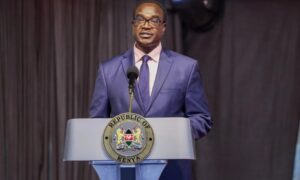Nairobi, Kenya – In a significant move addressing the nation’s escalating wage bill, the Cabinet Secretary for Public Service, Performance, and Delivery Management, Hon. Moses K. Kuria, has officially declined to implement the newly proposed salary structure for public servants. This decision, articulated in a detailed letter dated 3rd July 2024 to Mrs. Lyn Mengich, Chairperson of the Salaries and Remuneration Commission (SRC), underscores the government’s commitment to fiscal prudence in light of Kenya’s economic challenges.
The Background
The letter references the Kenya Gazette Notice No. 177 of 9th August 2023, which outlined the new remuneration and benefits for state officers in both national and county governments, intended for implementation in the Financial Year 2024/2025 from 1st July 2024. The SRC, within its constitutional mandate, regularly reviews and sets these remunerations, advising the government accordingly.
The Wage Bill Crisis.
However, the Cabinet Secretary emphasized the pressing need to address the burgeoning wage bill, which currently stands at Ksh 1.1 trillion annually. This amount, consumed by approximately 900,000 public servants, accounts for 47% of the national revenue, leaving a mere 53% to cater to the needs of the remaining 54 million Kenyans, alongside debt servicing and development expenditures. Such figures starkly contrast the Public Finance Management (PFM) Act, 2012, which stipulates that the public wage bill should not exceed 35% of the national budget.
Hon. Kuria referenced the resolutions from the Third National Wage Bill Conference held between 15th and 17th April 2024. During this conference, a consensus was reached on the necessity of reducing the wage bill to 35% of revenue. This decision aligns with the ongoing austerity measures announced by President William Ruto, particularly following the withdrawal of the Finance Bill 2024.
The Ethical and Moral Perspective
In his correspondence, Hon. Kuria highlighted that the issue transcends economic considerations, labeling it as a moral and ethical challenge. “It is not sustainable to have 900,000 public servants from both levels of government consume Ksh 1.1 trillion annually, which is equivalent to 47 percent of national revenues,” he wrote. He stressed the importance of ensuring fair compensation for public servants while maintaining fiscal responsibility.
The Call to Action.
As the Cabinet Secretary responsible for Public Service, Performance, and Delivery Management, Hon. Kuria firmly declined to implement the gazette notice on increased salaries for the Executive arm of the National Government. Furthermore, he urged the SRC to degazette the implementation of the new salary structure across all levels of government.
“I urge the Salaries and Remuneration Commission and other institutions in the public sector on the need to make sacrifices that we expect other Kenyans to make,” he stated.
Broader Implications.
This move by the Cabinet Secretary is expected to have wide-ranging implications. It underscores the government’s stance on prioritizing economic stability and sustainable fiscal policies over short-term financial increments for public servants. The decision also calls for a collective effort from all public sector institutions to align with the broader national economic goals and austerity measures.
Conclusion
Hon. Moses K. Kuria’s decisive stance reflects a broader strategy to manage Kenya’s public finances prudently. By rejecting the implementation of the new salary structure, the government aims to ensure a more balanced allocation of national resources, ultimately promoting economic stability and growth. As the nation navigates these challenging economic times, such measures are crucial in steering Kenya towards a more sustainable fiscal future.




















